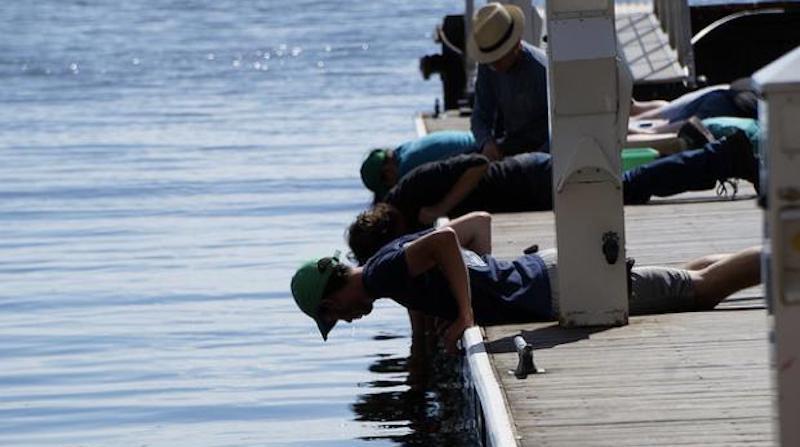Since 2000, the Massachusetts Office of Coastal Zone Management (CZM) has helped coordinate teams of scientific experts to periodically conduct a rapid assessment of marine species, including invasive animals and plants that have been introduced by human activity and have the capacity to harm the environment, economy, and public health.
The goal of the Rapid Assessment Survey (RAS) is to monitor marine species, track trends in distribution, detect new marine species introductions, and document regional patterns of established invaders through time. Every three to five years, a team of scientists visits marinas along the New England coast to observe, identify, and record marine organisms living in the fouling community. (The marine fouling community includes the organisms that attach to hard, submerged surfaces and the other mobile species living among them, often found on pilings and other underwater structures.) Experts (including divers) spend an hour at each site examining as many surfaces under the water as possible, searching for native, non-native, and cryptogenic species (species with as yet unresolved origins). Samples are collected and brought back to a laboratory for accurate identification. The surveys have identified new marine invaders, such as the European Rock Shrimp (Palaemon elegans), which is native to the northeast Atlantic. Range shifts have also been documented, including the northward expansion of the red algae Grateloupia turuturu since its introduction to Narragansett Bay from the northwest Pacific.
The most recent RAS was conducted in the summer of 2023 (August 7-11) and is the seventh survey to sample Maine and Massachusetts sites since 2000. CZM staff and a team of scientific experts visited nine marinas from Casco Bay, Maine, to Buzzards Bay, Massachusetts, to observe, identify, and record marine species found on floating docks and piers. See 2023 Rapid Assessment Survey: Non-Native, Native, and Cryptogenic Marine Species at Maine and Massachusetts Marinas (PDF, 20 MB).
Additional Information
For additional information and available reports on the results of the Rapid Assessment Surveys, see:
- 2023 New England Rapid Assessment Survey Page on iNaturalist - Many images of the species collected during the 2023 RAS are posted on this page on iNaturalist, a community science-based, biodiversity web platform.
- Flickr Photo Album of the 2018 Rapid Assessment Survey - This album includes photographs taken by CZM staff and EPA divers during the 2018 RAS.
- Report on the 2018 Rapid Assessment Survey of Introduced, Cryptogenic, and Native Marine Species at New England Marinas: Massachusetts to Maine (PDF, 2 MB) - Published in 2020 by CZM, this report summarizes the results of the 2018 RAS at eight sites from Buzzards Bay, Massachusetts, to Casco Bay, Maine.
- Report on the 2013 Rapid Assessment Survey of Marine Species at New England Bays and Harbors (PDF, 55 MB) - This CZM report, published in 2014, summarizes the results of the 2013 RAS at 18 sites from Rhode Island to Maine.
- Report on the 2010 Rapid Assessment Survey of Marine Species at New England Floating Docks and Rocky Shores (PDF, 10 MB) - This report published by CZM in 2013 summarizes the results of the 2010 RAS at 20 sites from Rhode Island to Maine.
- Marine Invaders of the Northeast (PDF, 2 MB) - This 2003 report published by the MIT Sea Grant College Program summarizes the results of the 2003 Rapid Assessment Survey at 20 sites from New York to Maine.
- There Goes the Neighborhood: The 2003 Northeast Invasive Species Survey - This article on page 56 of the Winter 2004/2005 Coastlines discusses the August 2003 rapid assessment survey of invasive marine species conducted along the New England coastline.
